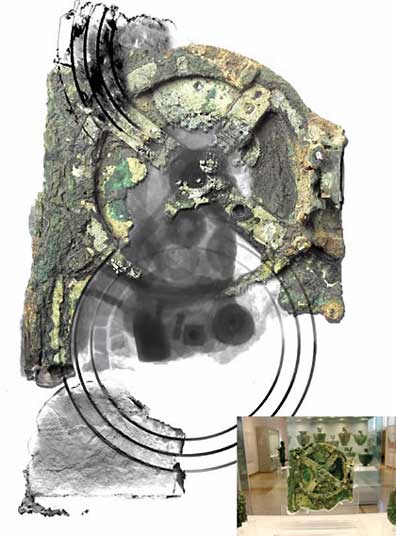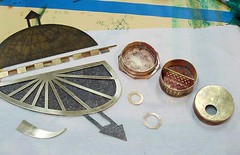Here are the brass parts for the Dream Focusing Device. They need to be really clean so I can put the resist on for etching. Today I sanded them thoroughly. I also made a new top for the receiver. It's the one in the center back. I form the side wall, which is basically a wide bracelet, then I solder that seam. Then I place it on a base which is larger than the oval, and solder the side wall to the base. There are more precise ways to make boxes, but I'm not patient enough. This seems (pun!) to work fine. I need to trim the extra parts of the base away now, and file the edges round. The old top, which is at the lower right, has a small gap in the back seam. It was bothering me, so I figured I had to try to make a better one.
I haven't been in the studio much. Mostly 40 minutes here and there. But it does add up. I can "see" this thing finished now, and am enjoying working on it. We will have a week off later this month, so I'm hoping for some significant progress.
Sunday, December 17, 2006
Saturday, December 02, 2006
The Antikythera Mechanism

This is a bronze device found on a sunken ship near Antikythera, in Greece, that is almost 2000 years old. The image above comes from an article in Nature. This device was able to calculate a number of astronomical events. It's not clear exactly what functions it was built to perform, but it's a very complicated instrument with at least 30 gears. Check out this wikipedia article.
Why am I interested in this? Well, I am fascinated by archeology and ancient brass instruments. This seems to be the earliest known instrument of it's kind. I don't have the patience to sit and read the details on the computer screen, but the images are enchanting and inspiring. It is amazing that people 2000 years ago could build something this complex. I wonder what tools they used to shape it? And it seems to have been fairly accurate. This is not the kind of thing covered in art history classes. I always feel delighted when I find something like this.
Friday, December 01, 2006
Crimp this! Crimp that!
We had our heat worked on several weeks ago. One of the guys left an interesting tool one day. I immediately took it into my studio to see what it would do. (I did give it back the next day!) It was a crimper, used for making heating ducts a little smaller, so they fit together well. Erwin's crimper was a three blade version, with a very nice handle. He says they don't make them any more. Too Bad.
I did find an assortment of them on the internet, and ordered one made by Malco. It has five blades, they do also make three bladed crimpers. It feels very solid and has a nice handle. Today I was waiting for the inspector to check off the work, so I played with some copper. I used 24 gauge annealed copper for most of the tests. For one test I used tooling copper, which is around 30 gauge, and very soft. I sanded the copper pieces with 400 grit wet or dry sandpaper first. Then they were dipped in liver of sulfur, polished with a very soft brass brush. I repeat this until I like the color. Then I crimped in different patterns.
I like the look better than the metal crimpers that look like pasta rollers. (I have no idea what they're called.) This irregular texture is more appealing to me. However, it's a fairly large scale texture and might not work for jewelry. The crimps are about 1-7/8 inches long and 1/8th of an inch deep. It isn't a sharp fold in the metal. Below are the results. If you want to see these enlarged, check out my flickr photo set, Testing.

Sample one. This is the pattern I get crimping along one edge. This piece of copper is 24 gauge, about 4 inches wide.

Sample two. I was trying for rays here. I think the three blade crimper would be better. This is 24 gauge copper, about 2.5 inches wide.

Sample three. This is a piece of tooling copper, about 30 gauge. I scribbled on the back with a ball point pen, then colored the metal with liver of sulfur, crimped from both sides, and colored the metal again. 4 inches wide.

Sample four. I crimped from all angles, sometimes crimping over other crimps. 24 gauge copper, 2.5 inches wide.

This was sample four, hammered almost flat. This one starts to get interesting to me. A little more crimping and hammering might make it very nice.

Here is the back of sample four, I think it could be interesting with a little more sanding and coloring.

And this is sample two, hammered almost flat.
I did find an assortment of them on the internet, and ordered one made by Malco. It has five blades, they do also make three bladed crimpers. It feels very solid and has a nice handle. Today I was waiting for the inspector to check off the work, so I played with some copper. I used 24 gauge annealed copper for most of the tests. For one test I used tooling copper, which is around 30 gauge, and very soft. I sanded the copper pieces with 400 grit wet or dry sandpaper first. Then they were dipped in liver of sulfur, polished with a very soft brass brush. I repeat this until I like the color. Then I crimped in different patterns.
I like the look better than the metal crimpers that look like pasta rollers. (I have no idea what they're called.) This irregular texture is more appealing to me. However, it's a fairly large scale texture and might not work for jewelry. The crimps are about 1-7/8 inches long and 1/8th of an inch deep. It isn't a sharp fold in the metal. Below are the results. If you want to see these enlarged, check out my flickr photo set, Testing.

Sample one. This is the pattern I get crimping along one edge. This piece of copper is 24 gauge, about 4 inches wide.

Sample two. I was trying for rays here. I think the three blade crimper would be better. This is 24 gauge copper, about 2.5 inches wide.

Sample three. This is a piece of tooling copper, about 30 gauge. I scribbled on the back with a ball point pen, then colored the metal with liver of sulfur, crimped from both sides, and colored the metal again. 4 inches wide.

Sample four. I crimped from all angles, sometimes crimping over other crimps. 24 gauge copper, 2.5 inches wide.

This was sample four, hammered almost flat. This one starts to get interesting to me. A little more crimping and hammering might make it very nice.

Here is the back of sample four, I think it could be interesting with a little more sanding and coloring.

And this is sample two, hammered almost flat.
Subscribe to:
Comments (Atom)


